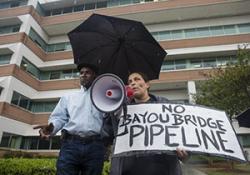Men rounded up in post-9/11 sweeps push suit against warden for physical, verbal, religious abuse
In a case heard by the U.S. Supreme Court last year, the Center for Constitutional Rights (CCR) Friday urged a federal court to protect the ability of people detained in federal prisons to sue for damages over violence and other abusive treatment. In a June 2017 ruling, the Supreme Court held that high-level federal officials could not be individually sued for their policy of profiling and ultra-restrictive conditions of confinement during the post-9/11 detentions. The Court sent claims against the warden, who allowed physical and other abuse not required by the high-level officials' policy, back to a lower court to determine whether the case against him may proceed.
The case, Turkmen v. Ashcroft (known in the Supreme Court as Ziglar v. Abbasi), was filed in the Eastern District of New York against prison administrators and high-level Bush officials for their roles in the profiling and abuse of detainees at the Metropolitan Detention Center (MDC) in New York City. In the wake of the 9/11 attacks, hundreds of non-citizen Muslim, Arab, and South Asian men were rounded up solely on the basis of their race, religion, ethnicity, and immigration status. They were held in extremely restrictive confinement and physically and psychologically abused. In sending claims against the warden back to the lower court, the Supreme Court questioned whether the men have the right to sue for damages, because although the Supreme Court had previously allowed such claims by people who were convicted and sentenced to prison, it hadn't ruled on the distinct question of claims by immigration detainees not convicted of anything.
"It makes no sense that those who are suspected of violating the immigration law should have less recourse for abuse than those who have been convicted of a crime and sentenced to prison," said Center for Constitutional Rights Senior Staff Attorney Rachel Meeropol. "These men were brutally beaten and harassed in a federal prison. There is no question that a prisoner in the next cell, beaten by the same guards, could sue the warden who allowed it to happen. To deny my clients this last opportunity for justice would be rank discrimination—and leave vulnerable thousands of other immigration detainees—at a time when racist and anti-immigrant violence demands our urgent attention."
Read the briefs filed here and here.
Read "Last Chance Accountability for Post-9/11 Round-Ups," a blog by Center for Constitutional Rights Legal Director Baher Azmy here.
Court orders government to clarify Guantánamo policy, attorneys react
[caption align="right"] [/caption]
[/caption]
As a result of the legal challenge to Trump's policy of discriminatory, indefinite detention filed January 11, 2018 by the Center for Constitutional Rights (CCR) and co-counsel, a week later a court ordered the federal government to provide information about its Guantánamo policy. CCR issued the following statement:
We're pleased the court is acting so quickly, though we already know a lot about the Trump administration's policy, which consists of punitive indefinite detention for detention's sake based on executive hubris and blatant anti-Muslim racism. It doesn't really matter what "policy" Trump's underlings respond with to the court because – as is clear from so many other instances –policy is what Trump says and does. The rest is often just cover for him.
The administration's actions and the words of the president himself illustrate the reality: their policy of indiscriminate indefinite detention is part and parcel of the president's broader white supremacist agenda, right along with the Muslim Travel Ban. After 16 years of Guantánamo, the only policy or process that would be legitimate to remedy the human rights and constitutional violations made endemic to this prison for Muslim boys and men would be to either charge or release the men who remain detained there.
Video highlights Guantánamo motion
Center for Constitutional Rights (CCR) filed the first major legal challenge January 11, 2018 to Trump's Guantánamo policy on behalf of men who have been imprisoned without charge or trial, most for nearly 15 years or more. View the video about the motion.
ICYMI - The New York Times' editorial: Donald Trump vs. Guantánamo's forever prisoners
The New York Times' editorial board published an editorial last Monday urging the courts to intervene on behalf of the "forever prisoners" at Guantánamo Bay Prison. The following is a short excerpt:
"If the Constitution stands for anything, the plaintiffs argue in their suit, which was filed on their behalf by the Center for Constitutional Rights, it must stand for the proposition that the government cannot detain someone for 16 years without charge.
The new legal challenge represents the sharpest test yet of America's commitment to its most important founding principles — the guarantee of due process and the right to habeas corpus — at the Guantánamo prison. Will we continue to tolerate locking up more than two dozen men there, without charge, forever?"
Bayou Bridge Pipeline opponents sue company for records related to land grab across proposed route
[caption align="right"] [/caption]
[/caption]
Louisiana groups represented by the Center for Constitutional Rights (CCR) last Monday filed a lawsuit against Bayou Bridge Pipeline LLC to make its records available to the public. The groups—including Atchafalaya Basinkeeper, Louisiana Bucket Brigade, and 350 New Orleans—are seeking the release of the documents as public records in light of the company's claim that it has authority under state law to expropriate the property of hundreds of Louisianans along the 162-mile pipeline route.
The lawsuit follows an initial request the groups submitted to the company, which was formed as a joint venture between Energy Transfer Partners, the company behind the Dakota Access Pipeline, and Phillips 66, on December 6, 2017. Lawyers for Bayou Bridge Pipeline LLC responded that they do not believe that the company is subject to public records laws.
The filing also comes in the wake of news of accidents and construction violations involved in other pipelines affiliated with ETP including the Dakota Access Pipeline, which has seen five spills in its first six months of operation; the Mariner East 2 Pipeline in Pennsylvania, where construction was suspended for failure to comply with building requirements; and the Rover Pipeline in Ohio where construction was suspended after emails revealed that the company had purposefully demolished a historic home "to avoid additional costs and prolonged regulatory proceedings." After filing the lawsuit last Monday, the groups held a rally outside of the state courthouse in Baton Rouge.
"Eminent domain is an extraordinary and controversial power, and those most often burdened frequently lack the financial means and political clout to protect their rights in the process," said CCR Senior Staff Attorney Pamela Spees, who grew up in Lake Charles, Louisiana, one of the communities that would be affected by the pipeline. "This authority is all the more dangerous and troubling when it is placed in the hands of a powerful corporation that claims it should not be subjected to the same transparency requirements as state agencies exercising that authority."

